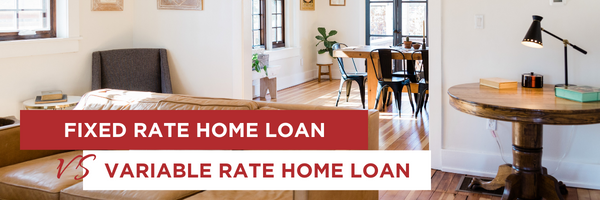Due to the unpredictability of interest rates, you may be debating whether or not now is the best moment to lock in the rate on your home loan.
One of the essential aspects of the process of purchasing a property is becoming knowledgeable about the distinctions between interest rates that are fixed and those that are variable.
For this reason, we have compiled this guideline, which will provide some information about the benefits and drawbacks of each type of loan, allowing you to determine which option will be most beneficial to you, given your circumstances.
Is A Fixed Rate Home Loan Better?
The term "fixed rate home loan" refers to the borrower "fixes" the interest rate at the current market rate, regardless of what that rate may be, for a predetermined amount of time. During that period, your interest rate will remain the same, irrespective of any changes in rates that may occur in the market.
What Benefits Of A Fixed Rate Home Loan Can You Get?
Lock in interest rates are popular with first-time homebuyers. A fixed-rate loan lets you know how much you'll pay back during the fixed rate period. Budgeting is easier with a fixed rate and repayment schedule. You'll also feel better knowing there won't be any shocks if interest rates climb during the fixed rate period.
What Drawbacks Of A Fixed Rate Home Loan Can You Get?
Redrawing or making more payments may not be possible. Even though you'll know your monthly payments, if interest rates fall, you'll still pay the higher rate for the fixed rate loan term. If you refinance to lower your rate, you may have to pay "break" or "exit" fees.
Is A Variable Rate Home Loan Better?
A loan with interest rates that are subject to change over the 25 or 30-year term of your loan is referred to as a variable rate loan. These loans typically follow the official cash rate changes set by the Reserve Bank of Australia (RBA), or they may be subject to change if your lender needs to make adjustments.

What Benefits Of A Variable Rate Home Loan Can You Get?
This loan usually offers redraw and offset accounts. If interest rates fall, your loan repayments will, too, save you money. Variable loans let you make extra payments to pay the loan faster and lower interest. A variable loan makes refinancing to a lower rate without significant break costs easier.
What Drawbacks Of A Variable Rate Home Loan Can You Get?
You get access to some cool things but also some drawbacks. If interest rates rise, you might have a more difficult time making your repayments. This could put you in a stressful financial position and make it more challenging to stick to your budget.
The Other Option You May Consider is: Split Loan
Split loans are the best of both. You "divide" your loan into fixed and variable parts, and you can choose which half is fixed.
This method lets you make extra payments to reduce loan interest. You can still use an offset account with a variable-rate loan.
If interest rates rise, just half of your loan will be affected, which may reduce your stress. Split loans allow extra repayments and minimize interest rate risk.
To learn more about this, you can visit our website or call us at 317-298-0961 now.

